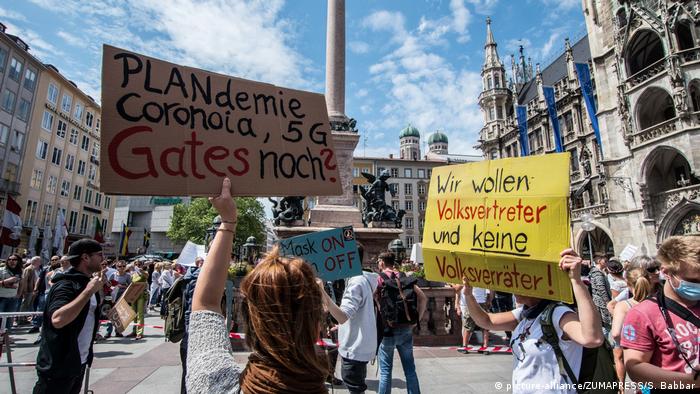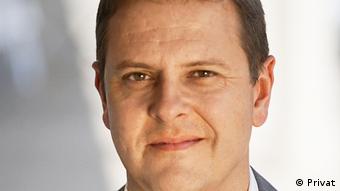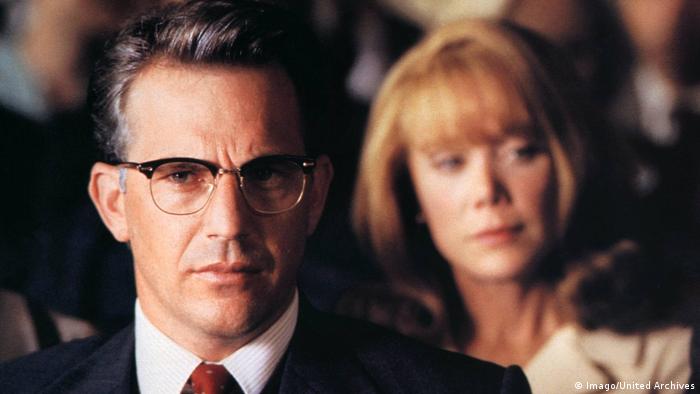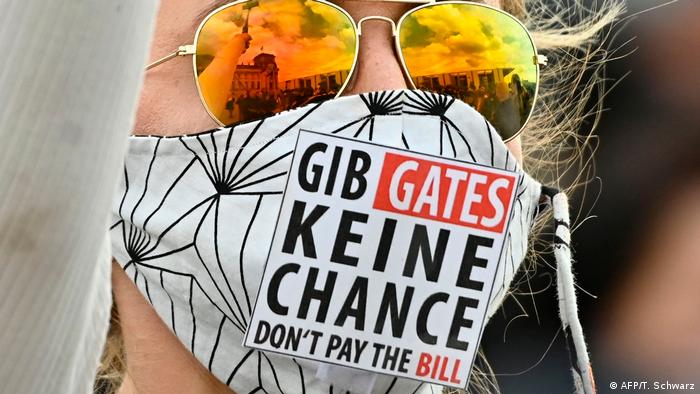The COVID-19 pandemic has helped congeal numerous fringe conspiracy theories that tend to rise up from the internet's darkest corners. But such paranoia has been around for centuries, and once was much more prevalent.
From anti-vaxxers to 9/11 truthers to the church of QAnon that believes a supposed secret cabal of all-powerful "deep state" pedophiles are trying to take down Donald Trump, diverse conspiracy faiths have conjoined to make the global coronavirus the ultimate new world order plot.
The broad tenets of the COVID-19 conspiracy came together in the viral Plandemic documentary, which began life on a QAnon Facebook page and which was shared by Republican politicians before it was banned on social media sites. In short, it wildly supposed that the coronavirus is the evil spawn of the Bill and Melinda Gates Foundation, who are helping to control the global population via a microchip inserted in all humans during coming coronavirus immunizations, with big pharma and big government complicit in the cover-up.

The 'Plandemic' video, promoting falsehoods and misinformation about the COVID-19 pandemic, has visibly informed these protesters in Munich
An old story
Such paranoid fantasies are nothing new. Conspiracies have been around for centuries and often build on established themes. Michael Butter, professor of American Literary and Cultural History at the University of Tübingen, says that between the 17th century and the 1950s, such fantastic stories were a universally accepted way of understanding the world. At the time, the theories most often were about subversives trying to undermine established power. Today the script has been flipped, meaning the all-powerful state and its mastermind cronies want to control the humble citizen.
The broad tenets of the COVID-19 conspiracy came together in the viral Plandemic documentary, which began life on a QAnon Facebook page and which was shared by Republican politicians before it was banned on social media sites. In short, it wildly supposed that the coronavirus is the evil spawn of the Bill and Melinda Gates Foundation, who are helping to control the global population via a microchip inserted in all humans during coming coronavirus immunizations, with big pharma and big government complicit in the cover-up.

The 'Plandemic' video, promoting falsehoods and misinformation about the COVID-19 pandemic, has visibly informed these protesters in Munich
An old story
Such paranoid fantasies are nothing new. Conspiracies have been around for centuries and often build on established themes. Michael Butter, professor of American Literary and Cultural History at the University of Tübingen, says that between the 17th century and the 1950s, such fantastic stories were a universally accepted way of understanding the world. At the time, the theories most often were about subversives trying to undermine established power. Today the script has been flipped, meaning the all-powerful state and its mastermind cronies want to control the humble citizen.

Professor Michael Butter
"The Age of Enlightenment introduced this mechanical view of all things being related to cause and effect, and this led to conspiracy theories," Butter told DW about the modern incarnation of these plots. "It was assumed that there was a deliberate intention behind every action."
In the 18th and 19th centuries, around 90% of the population probably believed in some kind of conspiracy, says Butter. He predicts that about 50% of people in the US, and more than a quarter of Germans, are still partial to such tall tales, even if they have become more stigmatized since World War II.
While conspiracy theories date back to Roman and Greek antiquity before they disappeared and resurfaced later during the European religious wars, they were ultimately dependent on the invention of the printing press. Early modern truthers flourished among a newly "literate public where anonymously written statements can be circulated," Butter notes. These cultivated "a certain understanding of history, and the influence of individuals on history."
Read more: Coronavirus: How do I recognize a conspiracy theory?
Conspiracists in the late 19th century, for example, found an enduring bogeyman to blame for the world's ills: Jewish bankers. As outlined in a fabricated manifesto titled the Protocols of the Elders of Zion, which was written by a Russian anti-Semite and published in 1903, Jews supposedly ran the world of money, finance and media, and would stop at nothing to increase this power. Automotive mogul Henry Ford famously printed half a million copies of the bogus Jewish plan for world domination.
The anti-Semitic theory informed devastating Nazi anti-Semitic propaganda. But it continues to this day. Far-right Hungarian Prime Minister Victor Orban and similarly inclined political individuals and groupings across Europe, including Germany's far-right Alternative for Germany (AfD) party, make out the Jewish investor and philanthropist George Soros to be not only a globalist pushing for one world government, but also a liberal who wants to spread immigration via a "Great Replacement" of white Europeans.

White supremacists chanted 'the Jews will not replace us' while marching in Charlottesville in Virginia in the US in 2017
'A service to mankind'
This is, however, the extreme end of the conspiracy spectrum. For psychologist Pia Lamberty, it's important not to simply write off those who who become vulnerable to such beliefs as "crazy or stupid people."
"We have to understand their fears," she told DW. In Germany, a nation that has suffered the worse excesses of totalitarianism, many of those protesting against the coronavirus lockdown fear that the state is infringing on what protesters in Berlin and other German cities called their "constitutional rights."
Mandated coronavirus measures are seen by some as part of longer-running conspiracy that a state they equate with socialism will soon trample the rights of freedom loving individuals.
"Most of the corona conspiracies, no matter which version and wherever they are virulent all over the world, is usually only the latest chapter in a much larger and longer conspiracy narrative," says Butter. "So the villains to a certain degree were already clear."
This is not like fake news, he adds, which is purposely disseminated to influence election campaigns, for instance. Like Lamberty, Butter stresses that conspiracy theory believers "are convinced they are doing a service to mankind by exposing what is really allegedly going on."
Watch video The coronavirus conspiracy? https://p.dw.com/p/3cugI
The truth is relative
If a kind of messianic altruism drives much of the faith in conspiracy theories, there is little chance people will disavow these beliefs.
That is why presenting proof that a conspiracy is bogus and contradicts the facts is, for many believers, merely proof of another conspiracy.
Briton Charlie Veitch was once of a vocal 9/11 conspiracy theorist on YouTube but decided the attack was real after a trip to the US with the BBC to examine the facts. In an interview in 2015, he joked about the backlash among truthers: "It was the CIA that took us to America, and I got paid $150,000 to shut up, to slowly wind up the YouTube channel, and to make the conspiracy world look bad."
In an article in The Conversation, Michael Butter notes that there is even a conspiracy about the emergence of the phrase conspiracy theory.
"This conspiracy theory claims that the CIA invented the term in 1967 to disqualify those who questioned the official version of John F Kennedy's assassination and doubted that his killer, Lee Harvey Oswald, had acted alone," he wrote.
But even if the term itself is new, the concept has been around for centuries.

ALL MADE UP? CONSPIRACY THEORIES IN MOVIES
'JFK' (1991)
US director Oliver Stone has often dealt with conspiracies in his films. His 1991 movie "JFK" looks into the alleged cover-up of President John F. Kennedy's assassination. Prosecutor Jim Garrison (Kevin Costner) does not believe that a lone gunman killed JFK; his theory is that a widespread network, the "deep state," is behind the assassination.
MORE PHOTOS 12345678910
Felix Schlagwein contributed reporting to this article.
DW RECOMMENDS
WWW LINKS
Pew Research survey on coronavirus
Why Bill Gates is the focus of the latest coronavirus conspiracy theories
AUDIOS AND VIDEOS ON THE TOPIC
Conspiracy theorists thrive in coronavirus crisis
Date 29.05.2020
Author Stuart Braun
Keywords conspiracy
Permalink https://p.dw.com/p/3cugI


No comments:
Post a Comment